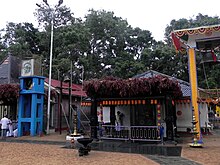Basnayake Nilame
| Kataragama temple කතරගම கதிர்காமம் |
|
|---|---|

Maha Devale/Murukan Kovil
|
|
| Geography | |
| Coordinates | 6°25′N 81°20′E / 6.417°N 81.333°ECoordinates: 6°25′N 81°20′E / 6.417°N 81.333°E |
| Country | Sri Lanka |
| Province | Uva |
| Location | Kataragama |
| Culture | |
| Sanctum | Kataragama deviyo |
| History and governance | |
| Date built | Approximately between 1100 - 15th century |
Kataragamam temple (Sinhalese: රුහුණු කතරගම දේවාලය, lit. 'Ruhuṇu Kataragama Dēvālaya', Tamil: கதிர்காமம் முருகன் கோயில், lit. 'Katirkāmam Murukaṉ Kōyil') in Kataragama, Sri Lanka, is a temple complex dedicated to Buddhist guardian deity Kataragama deviyo and Hindu War God Kathirkamam. It is one of the few religious sites in Sri Lanka that is venerated by the Buddhists, Hindus, Muslims and the Vedda people. For most of the past millennia, it was a jungle shrine very difficult to access; today it is accessible by an all-weather road. The shrines and the nearby Kiri Vehera are managed by Buddhists, the shrines dedicated to Teyvāṉai and Shiva are managed by Hindus and the mosque by Muslims.
Up until the 1940s a majority of the pilgrims were Tamil Hindus from Sri Lanka and South India who undertook an arduous padayatra or "pilgrimage on foot". Since then most pilgrims tend to be Sinhala Buddhists and the cult of Kataragama deviyo has become the most popular amongst the Sinhalese people. A number of legends and myths are associated with the deity and the location, differing by religion, ethnic affiliation and time. These legends are changing with the deity's burgeoning popularity with Buddhists, as the Buddhist ritual specialists and clergy try to accommodate the deity within Buddhist ideals of nontheism. With the change in devotees, the mode of worship and festivals has changed from that of Hindu orientation to one that accommodates Buddhist rituals and theology. It is difficult to reconstruct the factual history of the place and the reason for its popularity amongst Sri Lankans and Indians based on legends and available archeological and literary evidence alone, although the place seems to have a venerable history. The lack of clear historic records and resultant legends and myths fuel the conflict between Buddhists and Hindus as to the ownership and the mode of worship at Kataragama.
...
Wikipedia

